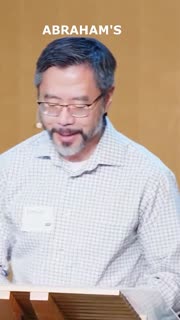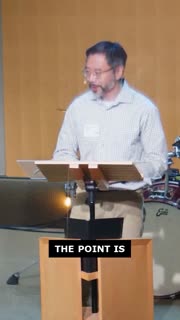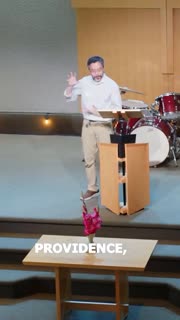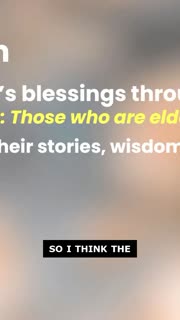God's Calling: Lessons from the Patriarchs
Devotional
Sermon Summary
Bible Study Guide
Sermon Clips
1. "I want you to think about Genesis chapters 12 to 50 like a viewfinder. It helps us to orient to the rest of the biblical story. Because what we've talked about, Genesis 1 to 11 so far, is like that big cosmic picture. It's seeing the whole universe, the whole creation, the whole world, all of humanity, all the nations. The creation of humanity. We talked about those things last week. And then in Exodus and beyond, we see God interacting with Israel, the nation of Israel, in a kind of very granular, fine detail." [02:03] (41 seconds)
2. "What we find when we look through that viewfinder is that we're now in about 2000 BC. What archaeologists and ancient historians call the Middle Bronze Age. 2000 years before the birth of Christ. And in this setting, God begins to speak to one man and his family. He calls him out of Babylon. So Babylon is a setting that Genesis chapter 11 ended with. The Tower of Babel is set in Babylon. Chaldea, from which Abraham is called, is set in Babylon. So from that universal global picture, the Bible starts to zoom in on one family, one man. And God promises to bless him." [03:50] (45 seconds)
3. "Abraham's life is not perfect. And yet he can be the vessel of blessing for God in this world. Instead, what the story of Abraham really is getting at is not the perfection of Abraham's faith, but that God is taking initiative and God is starting initiative. He's calling Abraham out to him from the nations. It's God who takes that first step to call Abraham out from Babylon. And it's God who repeatedly makes this covenant promise to him in these chapters." [10:35] (41 seconds)
4. "The point is that despite the brokenness of the world, things are not unsalvageable. In fact, that's exactly what God is doing in Abraham. He's trying to salvage. He's trying to repair. He's trying to fix what is broken. So God comes to Abraham, makes his promise. And finally, in chapter 11, chapter 21, a son is born to Sarah." [13:33] (28 seconds)
5. "I think one of the things that we can take from Abraham's life is this theme of calling, especially in that earlier part of our lives. We're often trying to figure out what is it that I'm meant to do? Who am I, my identity? What am I meant to do in this world? Well, I think the challenge for us is really, hear and listen to what is God calling us to do. What is God calling us? What has God made you to do?" [18:37] (35 seconds)
6. "Jacob is a key figure in this narrative. First of all, the name Jacob is full of meaning as is typical in the ancient world. Jacob is a twin. He's a fraternal twin. And we'll just move on to the next slide here. And Jacob, his name comes from the word heel. And that's because he's a fraternal twin. And the story goes that as he was born, he comes grasping or clutching his older brother Esau's heel. And so they call him Jacob, which means heel, or it comes from the word Hebrew, akav, which means heel." [23:30] (46 seconds)
7. "God's providence, despite human frailty, continues to carry the promise forward. That as God's people, God's children, that God can continue to work despite our human frailty. So I want to fast forward to the end of chapter 32, in which Jacob has this encounter with this strange, mysterious figure. As he's coming back home, he has lived abroad because he feared for his life after tricking Esau and his father. He feared for his life. He fled the land of Canaan, away from the promised land." [28:39] (43 seconds)
8. "I think we learn from Jacob's story. Is not to let go of that calling from God. And calling not in the sense of ministry, say in pastoral ministry or something, but calling in the sense of discipleship. What did Eugene Peterson call discipleship? A long obedience in the same direction. Thank you. A long obedience in the same direction. I think for a lot of us in this kind of middle section of life, the temptation is, it's easy to kind of get off that path, to take it off, take an off ramp off of that path and to do something else, be distracted, maybe disappointed, be disappointed with life and simply say, okay, you know, I'm going to kind of take a back seat here." [32:37] (44 seconds)
9. "Joseph, now a foreigner in Egypt, is able to bless Egypt. He helps, by his foresight and his interpretation of dreams, he's able to help Egypt survive the famine. Right? He... Blesses them with his gifts. And not only Egypt, but also the rest of his family. God miraculously brings them to Egypt, to him, and he helps them survive. And therefore, the story, the promise can continue." [37:44] (40 seconds)
10. "So I think the first application for us is not towards the elders, not directed to the elders, but really directed to the rest of us, is to honor our elders. Eldership in the ancient world was something valuable because they passed on through tradition. They represented wisdom. And experience. Today, I mean, in our age of novelty and technology and fast pace and changing things, like the elderly, we don't have that same sense of honor for them anymore. So the first thing, I think, is just for us to honor our elders, listen to their stories, their wisdom, their tradition, because they represent what God has done for us in the past and who God has been for us." [40:30] (54 seconds)
Ask a question about this sermon
2. "What we find when we look through that viewfinder is that we're now in about 2000 BC. What archaeologists and ancient historians call the Middle Bronze Age. 2000 years before the birth of Christ. And in this setting, God begins to speak to one man and his family. He calls him out of Babylon. So Babylon is a setting that Genesis chapter 11 ended with. The Tower of Babel is set in Babylon. Chaldea, from which Abraham is called, is set in Babylon. So from that universal global picture, the Bible starts to zoom in on one family, one man. And God promises to bless him." [03:50] (45 seconds)
3. "Abraham's life is not perfect. And yet he can be the vessel of blessing for God in this world. Instead, what the story of Abraham really is getting at is not the perfection of Abraham's faith, but that God is taking initiative and God is starting initiative. He's calling Abraham out to him from the nations. It's God who takes that first step to call Abraham out from Babylon. And it's God who repeatedly makes this covenant promise to him in these chapters." [10:35] (41 seconds)
4. "The point is that despite the brokenness of the world, things are not unsalvageable. In fact, that's exactly what God is doing in Abraham. He's trying to salvage. He's trying to repair. He's trying to fix what is broken. So God comes to Abraham, makes his promise. And finally, in chapter 11, chapter 21, a son is born to Sarah." [13:33] (28 seconds)
5. "I think one of the things that we can take from Abraham's life is this theme of calling, especially in that earlier part of our lives. We're often trying to figure out what is it that I'm meant to do? Who am I, my identity? What am I meant to do in this world? Well, I think the challenge for us is really, hear and listen to what is God calling us to do. What is God calling us? What has God made you to do?" [18:37] (35 seconds)
6. "Jacob is a key figure in this narrative. First of all, the name Jacob is full of meaning as is typical in the ancient world. Jacob is a twin. He's a fraternal twin. And we'll just move on to the next slide here. And Jacob, his name comes from the word heel. And that's because he's a fraternal twin. And the story goes that as he was born, he comes grasping or clutching his older brother Esau's heel. And so they call him Jacob, which means heel, or it comes from the word Hebrew, akav, which means heel." [23:30] (46 seconds)
7. "God's providence, despite human frailty, continues to carry the promise forward. That as God's people, God's children, that God can continue to work despite our human frailty. So I want to fast forward to the end of chapter 32, in which Jacob has this encounter with this strange, mysterious figure. As he's coming back home, he has lived abroad because he feared for his life after tricking Esau and his father. He feared for his life. He fled the land of Canaan, away from the promised land." [28:39] (43 seconds)
8. "I think we learn from Jacob's story. Is not to let go of that calling from God. And calling not in the sense of ministry, say in pastoral ministry or something, but calling in the sense of discipleship. What did Eugene Peterson call discipleship? A long obedience in the same direction. Thank you. A long obedience in the same direction. I think for a lot of us in this kind of middle section of life, the temptation is, it's easy to kind of get off that path, to take it off, take an off ramp off of that path and to do something else, be distracted, maybe disappointed, be disappointed with life and simply say, okay, you know, I'm going to kind of take a back seat here." [32:37] (44 seconds)
9. "Joseph, now a foreigner in Egypt, is able to bless Egypt. He helps, by his foresight and his interpretation of dreams, he's able to help Egypt survive the famine. Right? He... Blesses them with his gifts. And not only Egypt, but also the rest of his family. God miraculously brings them to Egypt, to him, and he helps them survive. And therefore, the story, the promise can continue." [37:44] (40 seconds)
10. "So I think the first application for us is not towards the elders, not directed to the elders, but really directed to the rest of us, is to honor our elders. Eldership in the ancient world was something valuable because they passed on through tradition. They represented wisdom. And experience. Today, I mean, in our age of novelty and technology and fast pace and changing things, like the elderly, we don't have that same sense of honor for them anymore. So the first thing, I think, is just for us to honor our elders, listen to their stories, their wisdom, their tradition, because they represent what God has done for us in the past and who God has been for us." [40:30] (54 seconds)










